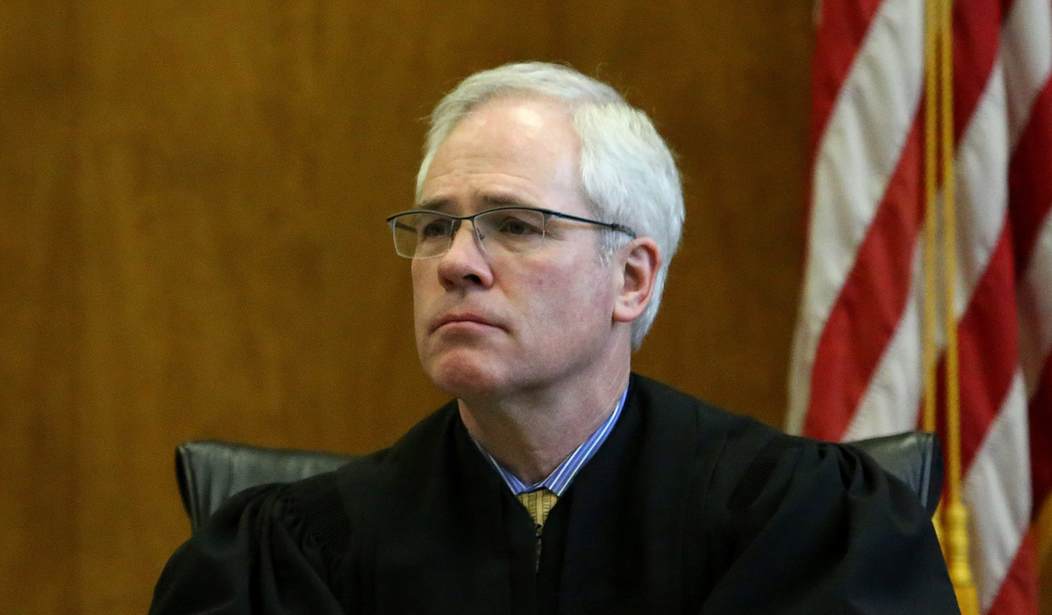The State of Oregon has Christian Judge Vance Day in its sights, hitting him with both felony charges in criminal court and a complaint at the Commission on Judicial Fitness and Disability. This after Judge Day privately arranged to have potential applicants apply to other judges to have same-sex marriage services performed, in an attempt to keep true to his Christian faith.
Now, the prosecution’s star witness in the criminal case finds his credibility in question over a sexual relationship he had with Judge Day’s court clerk. Incidentally, that clerk has also made claims of workplace sexual harassment against Day that have since been proven false.
Vance Day presides over the Veteran’s Treatment Court, which routes veterans charged with non-violent crimes into specific programs for substance abuse or mental health treatment. The standards for this court vary from the normal courtroom, owing to the specific needs of veterans who have come in contact with the legal system. According to the VA website,
In recent years, programs have been developed to keep war Veterans with mental health problems from being put in jail or prison. The programs aim to assist Veterans who become involved in the justice system to get treatment for mental health problems that may exist. This includes the numbers of Veterans returning from Afghanistan and Iraq.
Each Veterans Treatment Court is part of a community’s justice system. Veterans Treatment Courts often partner with local VAs and Veterans’ organizations. Since the first Veterans Treatment Court in 2008, the number of courts has been growing fast. By August, 2010, there were 41 Veterans Treatment Courts in the United States.
Brian Sheehan is a Navy Seal who appeared in Judge Day’s court after being arrested for felony DUI. Court records show that Sheehan appeared multiple times in Day’s court, and in fact spent time with Day outside of the court. In the course of investigating Day for the Judicial Fitness Commission, state officials found evidence they say indicates that Day allowed Sheehan to handle weapons on Day’s property while Sheehan was a convicted felon. Sheehan’s charges were subsequently reduced to misdemeanors after he completed court-imposed treatment.
The Oregon Attorney General’s Office filed felony complaints against Day for aiding and abetting a felon in possession of a firearm. The state’s case relies almost exclusively on Sheehan’s testimony.
In a Motion to Supplement Record filed on October 26, 2017, Day’s attorneys submitted the following statement:
As this Court is well aware, the credibility of witnesses is significant to the decision on the Court’s de novo review of this matter. The proposed exhibits reflect the disclosure by the Oregon DOJ counsel prosecuting Judge Day in the criminal case that Megan Curry, a significant witness in this Judicial Fitness Commission matter, initially lied to the prosecution about her relationship with BAS [Brian Sheehan, referred to only by his initials in many filings] in an interview in the presence of her own lawyer. Specifically, she initially denied that she and BAS were anything more than friends, but only later disclosed the truth, that she had a sexual relationship with BAS. (Proposed Ex. 659.)
Of course, BAS is another important witness in the Judicial Fitness Commission matter whose credibility is at issue. The fact that these two witnesses, Megan Curry, Judge Day’s judicial clerk, and BAS, a felon on probation and appearing regularly before Judge Day in the court where Ms. Curry worked, had a sexual relationship, and the fact that Ms. Curry lied about it in her initial conversations with the Department of Justice attorneys in the presence of her own attorney, is important evidence for this court to consider in determining the credibility of the witnesses and in making its decision.
The court eventually granted the motion to include this evidence in upcoming hearings.
As mentioned earlier, in a prior hearing before the Judicial Fitness Commission, Curry alleged that Judge Day touched her inappropriately in a hallway in the courthouse. Day’s defense team was able to rebut this allegation as false, based on video taken from security cameras in the hallway at the date and time the act allegedly occurred.
PJ Media reached out to Curry for comment on her sexual relationship with Sheehan, as well as the false allegation against Day. When reached by phone, Curry refused to comment, referring PJ Media to her supervisor. When asked for that person’s name and phone number, Curry put the call on hold and never came back.
The false allegation, the initial lying about the sexual relationship with the state’s star witness, and the conflict of interest created by that relationship all appear to put Curry into significant hot water professionally.
In a separate motion, Day’s defense team attempted to gain access to certain portions of Sheehan’s psychological file from the Veteran’s Administration. Sheehan suffers from PTSD and a traumatic brain injury (TBI) resulting from combat duty. Day’s defense team believes that Sheehan may suffer from memory issues, which may call into question his recollection of events. In response, Sheehan retained counsel to help him block a subpoena for his medical records. His attorney, Sean Riddell, took the case pro bono.
The judge quashed Sheehan’s attempt to block the subpoena of his psychological records. In response, Riddell filed a motion to declare Sheehan a victim of Day. If granted, this would give Sheehan the right under the Oregon Constitution to avoid facing his accuser. This type of motion usually applies to victims of sexual abuse or child abuse.
Riddell agreed to an interview with PJ Media. He explained the reasoning behind his motion. “Technically, a felon in possession is a victimless crime,” Riddell said. “[You don’t] have to have someone there saying they were hurt by this felon in possession of a firearm. You just gotta prove the felon had possession. But the nature of the facts surrounding it, in that Judge Day used his power to force Brian Sheehan into certain actions, caused Mr. Sheehan emotional trauma. Brian’s declaration is in [court filings], where he details what Vance Day’s actions caused him emotional trauma.”
The judge granted the motion, and Riddell says that he has filed a new motion to quash the subpoena of Sheehan’s psychological records. The results of this motion are still pending.
Regardless of the outcome of the motion to quash, Day’s defense makes a strong assertion that the main witnesses in each case have significant credibility issues. It remains to be seen whether they can convince the court.
You can follow Jeff Reynolds on Twitter at @ChargerJeff.










Join the conversation as a VIP Member